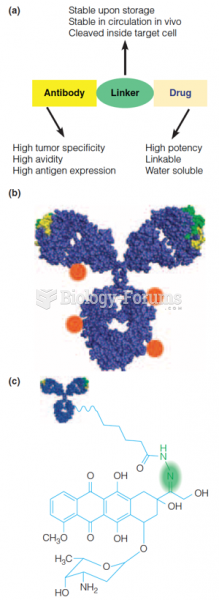|
|
|
Nearly 31 million adults in America have a total cholesterol level that is more than 240 mg per dL.
The eye muscles are the most active muscles in the whole body. The external muscles that move the eyes are the strongest muscles in the human body for the job they have to do. They are 100 times more powerful than they need to be.
There are over 65,000 known species of protozoa. About 10,000 species are parasitic.
Increased intake of vitamin D has been shown to reduce fractures up to 25% in older people.
Coca-Cola originally used coca leaves and caffeine from the African kola nut. It was advertised as a therapeutic agent and "pickerupper." Eventually, its formulation was changed, and the coca leaves were removed because of the effects of regulation on cocaine-related products.







